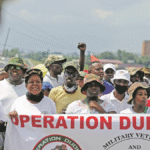As the clamour for effective governance rises across Africa, the Southern African Development Community (SADC) finds itself increasingly sidelined, accused of inadequacy in upholding the very principles it was designed to champion. Once celebrated for its vision of regional unity and progress, SADC has now become an institution that critics say is mired in corruption, failing to ensure human rights, democracy, and genuine leadership. This shift has led to SADC being labelled by many as nothing more than a club of liberation movements, protecting power rather than promoting people’s rights and development. The organisation’s inability to hold member states accountable for abuses and its silence in the face of crises reveal a lack of the collective leadership necessary to address the region’s most pressing issues.
One of the most glaring examples of SADC’s inaction arose during the Covid-19 pandemic. By May 2021, most Southern African countries, aside from Mauritius and Seychelles, had vaccinated fewer than one percent of their populations. Despite the urgency brought on by more infectious variants, SADC offered no meaningful guidance on vaccine rollouts, highlighting its disconnection from the reality on the ground. Efforts to accelerate vaccine equity were left to organisations like Oxfam, Amnesty International, and the International Commission of Jurists (ICJ), who coordinated human rights defenders and health experts to push for greater access. In contrast, SADC’s silence was deafening, failing to advocate for vaccine distribution or to hold governments accountable to their people’s health rights.
This lack of response during the pandemic highlighted SADC’s failure to meet its mandate. Human rights obligations, enshrined in the SADC founding treaty and in regional and international charters, demand active leadership and accountability, values the organisation seemingly disregarded. Although Southern Africa faces a unique set of public health challenges, SADC chose to ignore its obligation to “coordinate regional efforts on epidemic preparedness, prevention, and control,” as stipulated in its health protocol. This abdication allowed member states to disregard their commitments to international human rights law, with no repercussions from SADC.
Over time, SADC has evolved into an institution more concerned with political survival than with human rights and democratic values. The organisation’s decisions, particularly the dismantling of the SADC Tribunal, a body that provided recourse for victims of human rights abuses have further underscored its disregard for individual protections. This dismantling effectively blocked avenues for people to seek justice within their own region, leaving countless citizens exposed to abuse and exploitation with no hope for remedy from a regional authority.
The issue of vaccine access further illustrated SADC’s reluctance to advocate for its own people. Despite international efforts, including the TRIPS waiver, aimed at improving access to vaccines, SADC did little to leverage this initiative or to create a coordinated vaccine procurement strategy, ignoring its mandate to “assist one another in the production, procurement, and distribution of affordable essential drugs.” In effect, SADC stood by while millions in Southern Africa remained vulnerable, revealing an organisation disconnected from the needs and rights of its citizens.
SADC’s failure is not limited to healthcare but extends to its unwillingness to enforce standards for democracy, governance, and transparency among member states. Elections in Southern Africa are frequently marked by accusations of fraud and voter manipulation, yet SADC remains conspicuously silent on the need for free and fair elections. By allowing leaders to manipulate democratic processes, SADC enables a culture of impunity, where leaders are rewarded for their allegiance to the liberation movement’s legacy rather than their service to the people.
In place of promoting genuine leadership, SADC has devolved into a sanctuary where leaders can evade accountability. Member states, in turn, have exploited this lack of oversight, maintaining power through corruption and the systematic abuse of state resources. Those who commit fraud or suppress dissent within their nations often find SADC’s tacit support, cementing the organisation’s reputation as a protector of corrupt governance rather than a promoter of democratic ideals.
For Southern Africa to progress, SADC must abandon its protective stance toward leaders and realign with the principles it was founded upon. The issues of human rights abuses, lack of accountability, disregard for democratic processes, and systemic corruption have marred the organisation’s credibility. If SADC continues down this path, it risks permanent irrelevance in the eyes of its people.
Only through a committed effort to promote transparency, human rights, and democracy can SADC reclaim its role as a leader in the region. Without such reforms, it will remain a symbol of stagnation and protectionism, shielding those who ignore the voices of the people they are meant to serve. For SADC, the path forward demands courage and a willingness to prioritise people over power, for the future stability and prosperity of Southern Africa.










